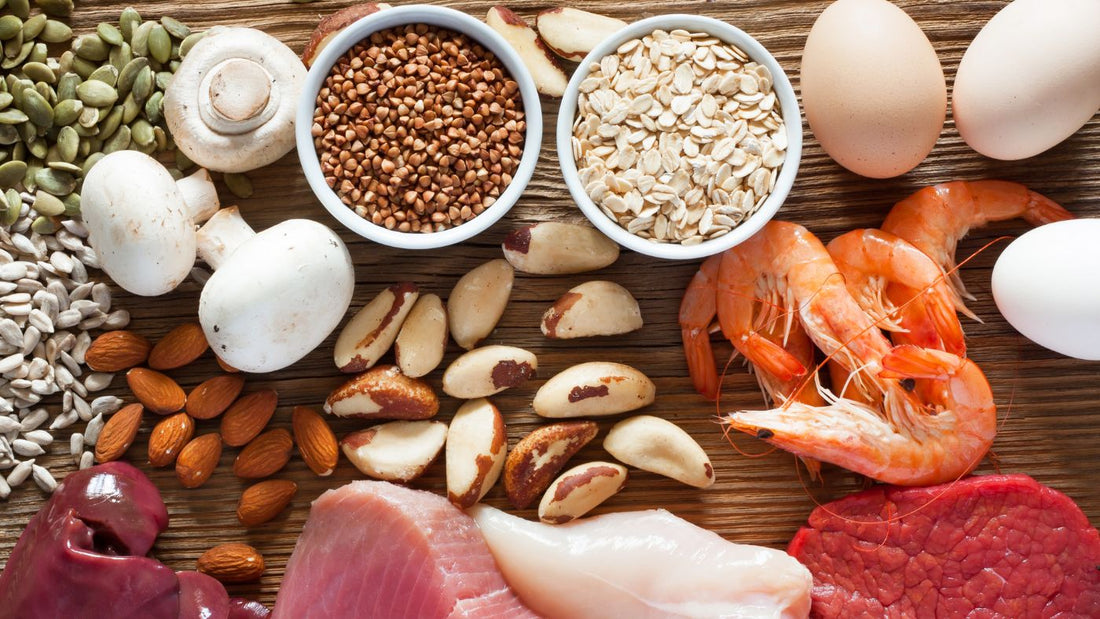5 Tips for Male Fertility
Read more

Those with thyroid conditions might be slightly more aware of some of the benefits of selenium supplementation for thyroid and hormone support.*
But no matter how well-versed you are on this nutrient, there’s a LOT more to cover in terms of how it folds into your overall health. Selenium can help support fertility in both men and women, which is essential information to have on hand if you and your partner are trying to conceive!*
In this post, we want to empower you with knowledge about:
(If you would like a quick catch-up on how thyroid function impacts fertility, pregnancy, and breastfeeding, circle back, and don’t worry, we'll wait.)
It can help support thyroid health, cognition, antioxidant activity, immune resistance, and heart health.
You might recall that when the word “essential” precedes a nutrient, it simply means that our bodies don’t create it, making it essential to ingest specific amounts of it through food and supplements. Lucky for us, selenium is found naturally in our soil, water, and some foods. It is an essential component of enzymes and proteins called selenoproteins. Selenoproteins help synthesize DNA, working overtime using their antioxidative powers to protect cells and support immunity.* Selenoproteins are heavily involved in the metabolism of thyroid hormones and - you guessed it - the reproductive process (1)!
From a total health standpoint, selenium has been associated with and may support hormonal balance, heart health, and cognitive health (2).* Like I mentioned at the top, those with thyroid disorders might be all too familiar with how selenium factors into the conditions that they must actively manage every day. The thyroid gland has an ultra-high tissue concentration of selenium (3).
Since selenoproteins utilize selenium for essential antioxidant activity, selenium contributes to the antioxidant defense in the thyroid by removing oxygen free radicals generated during the production of thyroid hormones (3) and also aids the metabolism of thyroid hormones.* This mineral works synergistically with critical vitamins like vitamins E, A, and C to support the free radical defense.* Additionally, it has been found to support healthy levels of testosterone and glutathione, a powerful antioxidant that benefits fertility.*
Call it a renaissance mineral, a micronutrient of all trades. Selenium can remarkably adjust and adapt as needed in a given environment, particularly between sexes.
Selenium plays a significant role in producing mature spermatozoa from immature spermatids.* It also contributes to the formation of glutathione peroxidase, an enzyme in the midpiece of human spermatozoa that protects it from oxidative stress, improving individual sperm quality (4)*.
Sperm production regulates itself with unique hormones in the pituitary gland (FSH, LH) and testicles (testosterone). When blood levels of these hormones are off, sperm production may be low or absent. Selenium supplements can support sperm motility, while a combination of selenium and vitamin E can support free radical defenses and sperm motility in infertile men (5).* Recent studies observe that supplementing men trying to conceive with these two micronutrients experienced an incremental improvement in sperm motility, morphology, or both.* Deficiencies may also be a leading cause of infertility in men, accounting for deterioration in the quality of semen and sperm motility (7).
Other research has doubled down on these ideas, showing that most subfertile men with low selenium status can improve sperm motility and the chance of successful conception by packing their diet with selenium-rich foods and supplementing with a high-quality supplement when appropriate (8).
While we need concrete, conclusive results from more high-quality, recently reviewed, and published research, selenium's integral role in female fertility and during pregnancy is predominantly undisputed. Aside from its role in thyroid hormone synthesis and immune response regulation, when it comes to the female reproductive system, selenium is most obviously involved when it’s not there and working. Healthy selenium levels support a healthy pregnancy, aiding neural tube development, optimizing the length of pregnancy and birth weight, and promoting healthy blood sugar levels. In addition, preterm delivery and low birth weight risks minimize for women who maintain healthy selenium levels through supplementation compared to women who don’t (2).
I have great news for my US-based parents-to-be. Full-blown selenium deficiency is rare in North America because the soil is generally rich in selenium. Even for those who live in areas with lower selenium content, the transport infrastructure of food across the country largely compensates. In addition, the regular practice of utilizing fortified foods and supplements helps reduce the risk of deficiency (1).
For some, it does take a bit of work to incorporate more selenium-rich foods through diet, mainly because the list is diverse and lacks clear patterns from major food groups.
Regarding supplementation, I consciously considered the individual needs of men and women during formulation.
However, by design, our fertility multivitamin and mineral complex for men and our women’s prenatal contain 200mcg of selenium! This amount is optimal to protect and support sperm health and production for future dads. At the same time, it can also help mom and growing baby throughout preconception, pregnancy, and breastfeeding.*